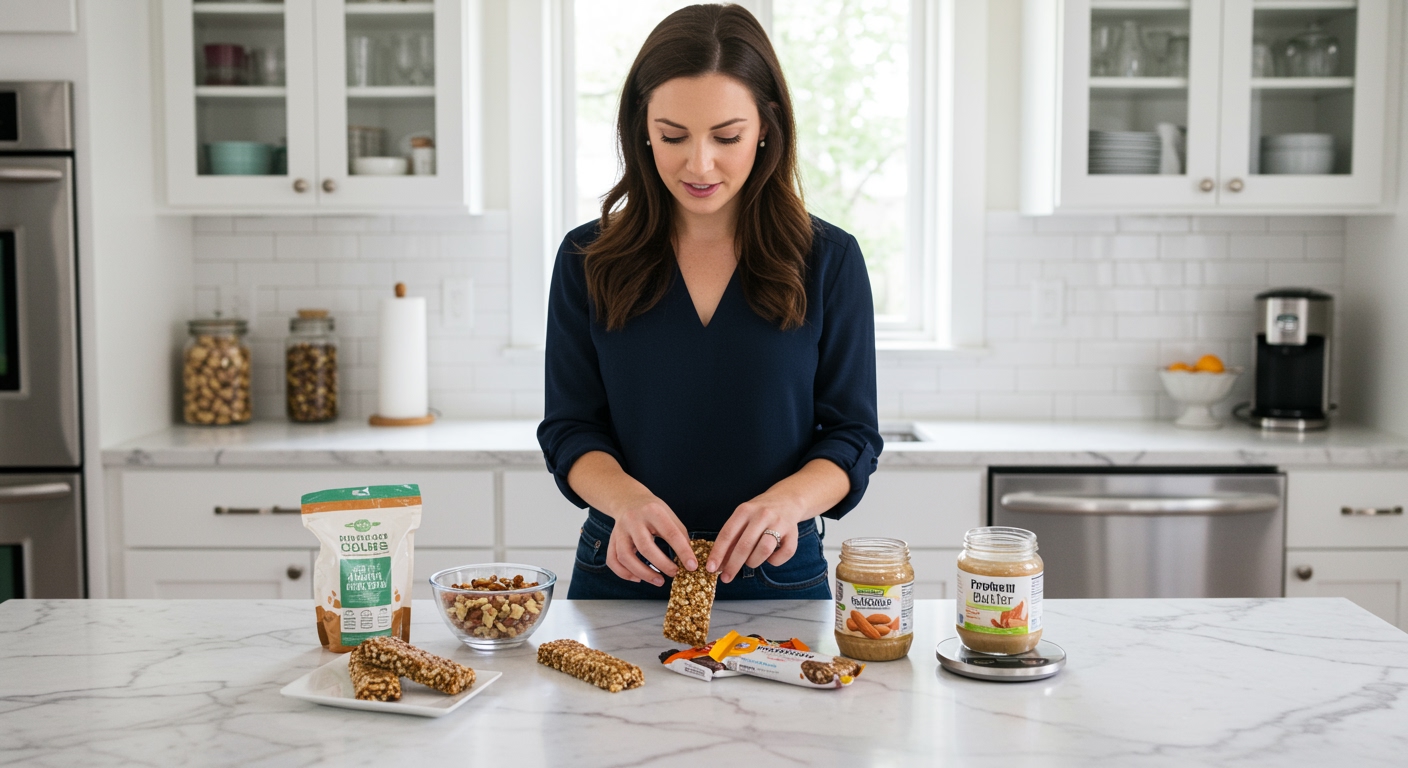✪ Key Takeaway: Granola bars are not always bad for PCOS when you choose low-sugar, high-protein options with minimal processing.
Introduction
You grab a granola bar thinking you made a healthy choice, then your blood sugar spikes higher than if you ate a candy bar.
This frustrating scenario happens because most women with PCOS do not realize that many commercial granola bars contain more added sugars and refined carbohydrates than actual nutritious ingredients.
Hi, I am Abdur, your nutrition coach and today I am going to explain which granola bars can actually support your PCOS management and which ones will sabotage your progress.
What Makes Most Granola Bars Problematic For PCOS?
Commercial granola bars often contain 12-15 grams of added sugar per serving, which equals about 3-4 teaspoons of pure sugar.
This sugar content causes rapid blood glucose spikes that trigger excessive insulin release in women with PCOS.
High insulin levels worsen PCOS symptoms by increasing androgen production and promoting fat storage around the midsection.
Many popular brands also use high fructose corn syrup, brown rice syrup, and other processed sweeteners that create similar metabolic disruption.
The refined oats and processed grains in these bars lack fiber and protein needed to slow down sugar absorption.
✪ Fact: Some granola bars contain more sugar per gram than chocolate chip cookies.
Which Granola Bar Ingredients Support PCOS Management?
Protein content should be your first priority when selecting granola bars for PCOS management.
Look for bars containing at least 8-10 grams of protein from sources like nuts, seeds, or protein powder.
Healthy fats from almonds, walnuts, chia seeds, or flaxseeds help slow down carbohydrate absorption and improve insulin sensitivity.
Fiber-rich ingredients like whole oats, psyllium husk, or coconut flour create better blood sugar stability.
Natural sweeteners like stevia, monk fruit, or small amounts of raw honey cause less dramatic insulin responses than refined sugars.
Avoid bars with more than 6 grams of total sugar and choose options with a protein-to-carb ratio of at least 1:2.
✪ Pro Tip: Choose bars where protein appears in the first three ingredients on the label.
How Do Homemade Granola Bars Compare To Store-Bought Options?
Making granola bars at home gives you complete control over sugar content and ingredient quality.
You can replace refined sugars with PCOS-friendly sweeteners and increase the protein density significantly.
Homemade versions allow you to add specific nutrients like inositol powder or cinnamon that support insulin function.
Store-bought options often contain preservatives and artificial flavors that may worsen inflammation levels in women with PCOS.
However, quality commercial brands do exist that meet PCOS-friendly criteria when you read labels carefully.
The key difference lies in processing methods and the ratio of whole food ingredients to additives.
✪ Note: Homemade bars stay fresh for up to one week when stored in airtight containers.
When Should You Eat Granola Bars With PCOS?
Timing matters significantly when consuming any carbohydrate-containing food with PCOS.
Eating granola bars within 30 minutes after resistance training helps muscles absorb glucose more efficiently.
Morning consumption works better than evening because insulin sensitivity naturally decreases throughout the day.
Pairing granola bars with protein sources like Greek yogurt creates better blood sugar control.
Avoid eating them during sedentary periods when your muscles cannot effectively utilize the glucose for energy.
Consider them as pre-workout fuel rather than casual snacks to maximize their metabolic benefits.
✪ Pro Tip: Wait at least 3 hours between granola bar consumption and bedtime for better sleep quality.
What Are Better Snack Alternatives For PCOS?
Protein-rich alternatives often provide better satiety and blood sugar stability than most granola bars.
Hard-boiled eggs with a small handful of nuts deliver complete protein without added sugars or processed ingredients.
Greek yogurt mixed with chia seeds and berries provides probiotics that support gut health and hormone balance.
Homemade energy balls made with almond butter, coconut flour, and stevia offer similar convenience with better nutrient density.
Raw vegetables with hummus or guacamole provide fiber and healthy fats without triggering insulin spikes.
These alternatives typically cost less per serving and offer superior micronutrient profiles compared to processed bars.
✪ Fact: Protein-based snacks increase metabolism by 20-30% more than carbohydrate-based options.
The Bottom Line
Granola bars are not inherently bad for PCOS when you choose wisely and eat them strategically.
Smart nutrition choices happen in the grocery store aisles, not at the dinner table – so invest time in reading labels and understanding ingredients.
I would love to hear about your favorite PCOS-friendly snack discoveries or any questions you have about managing blood sugar with convenient food options in the comments below.
References
At NutritionCrown, we use quality and credible sources to ensure our content is accurate and trustworthy. Below are the sources referenced in writing this article:
- PCOS Meal Planner: Granola Bars vs Protein Bars Best for PCOS Snacks
- PCOS Weight Loss: PCOS Friendly Protein Bars
- PCOS Meal Planner: PCOS Friendly Granola Complete Guide to Low Sugar Breakfast Options
- Brown Health: Eating Well Polycystic Ovarian Syndrome PCOS
- Plate and Canvas: Top 20 Easy Snacks for PCOS from a Dietitian





